Genre: Sports Developer: Namco Publisher: Namco Players: 1-2 Released: 1991
Namco was one of the first third party companies to support the fledgling Genesis, and the initial handful of titles it released was highly regarded by many owners of the console. At the time, Sega fans weren’t very accustomed to seeing a major publisher create content for hardware that wasn’t made by Nintendo, and to see such an important company join the Genesis stable with a decent-sized lot of quality content was especially uplifting. If a publisher as deeply tied to Nintendo as Namco was now making games for the Genesis, other hard hitters like Capcom and Konami couldn’t be far behind, right?
Unfortunately, that’s not the way things turned out. As history notes, the relationship between Sega and Namco almost ended as quickly as it began, as the iron fist of Nintendo licensing made it almost impossible for companies to publish content on competing platforms. Eventually, this policy would be overturned in court, but for the first few years of the Genesis’ life, there were very few major publishers willing to go against the House of Mario. Namco released what it already had in development and returned to its master until a lawsuit gave it its freedom.
Among the great titles like Phelios and Marvel Land was Powerball. With all the quality arcade ports Namco released, this one has tended to fly well below the radar of most Genesis owners. The game certainly didn’t set the world on fire, and there are plenty of other sports titles on the console that do the whole “brutal sports” theme much better (Mutant League Football, anyone?), but Powerball was among the first to do it at all. What it offers is solid gameplay and a simple-yet-addicting style that manages to mix martial arts, American football, and soccer to make a decent concoction for killing an afternoon with a friend.
Powerball is one of those games that’s simple to learn but quite difficult to master. It takes the passing and shooting elements of soccer and mixes them with the tackling of American football in order to create a sport that’s frantic and quickly paced. The controls are pretty basic, alternating between kicking, passing, and attacking on offense and tackling and switching players on defense. With only two real things to worry about (shooting/passing and tackling) one would assume that it would be easy to dominate opponents. The truth is quite the contrary, and gamers will have to learn when to drop the ball and attack an opposing player in order to maintain possession or when to take a shot at the goal. Scoring is achieved via a single-point goal shot or by running the ball into the end zone for three points. Kicking, throwing, or running out of bounds results in a goal shot (or a penalty shot if the defending team sends the ball out of bounds in its own end zone), and there’s a kickoff after every score. Holding one of the buttons down charges the corresponding move, and the selected player’s arrow will turn red to indicate a full charge. A fully-charged tackle can level opponents for several seconds, leaving the player free to advance, and a charged kick, indicated by the ball turning red, is especially hard to block. Teams basically try to kill the guy with the ball to stop him from scoring, and this is done by tackling and attacking. There are four types of tackles in the game: shoulder smash, a drop kick, and a dynamic bash (kind of like a diving tackle at the chest), and the “flying bomb” move (an aerial attack where the player leaps upwards and crashes down on his opponent). Trust me, the computer is very adept at all of these moves.
Each team has a goalie that operates similar to soccer but with one crucial difference: he can have the ball taken away. Unlike soccer, where goalies must be allowed some time to distribute the ball once they have grabbed it, Powerball lets gamers mow them down and snatch the ball away, making for some easy scores. This means that goalies must grab the ball and release it quickly, lest they be knocked flat and leave their goal completely defenseless.
Games are divided into four quarters, with each side switching goals at the start of each new quarter (much like American football). Quarter length can be set to several different times in the options menu, but the game is so fast that those playing probably won’t notice the speedy clock ticking down. Personally, I like to set the length to 2:30, which allows for Powerball to be played in short spurts. Any ties are resolved via sudden death, and this can lead to some frantic action once regulation time ends, especially if the clock is short.
One thing about this game that really surprised me was its league mode. In addition to the single and two-player exhibition modes, either one or two players can take any of the twelve nation teams and start a multi-game league. Team members can be upgraded with bonus points at the start, and there’s even a password function that uses few characters. This might seem standard now, but saving a season and coming back later was not very common in early Genesis sports titles, and it was quite unexpected but welcome here. Lamentably, this as deep as the game goes with its league, and aside from the multi-game schedule, nothing is really different from the exhibition games. This can make things repetitive when playing against the computer.
Perhaps the only thing I really don’t like about Powerball is just how overaggressive the computer AI is. Yes, it’s fine to get a challenge from the computer, but the AI here is just ridiculous sometimes. It almost never allows the goalie to hold the ball for more than a second, and such events almost always end in a quick attack and a computer score. The AI is also brutally eager to use power attacks, and I had games where half my team was flattened by a single power kick! This is mostly what I meant about “difficult to master.” At first, it feels like the computer is a dirty cheater, but with time one learns that it’s just a damn professional waiting for some rookie meat. Unless one has the time to invest in really learning all the ins and outs of the gameplay (something I recommend doing), the game is perhaps best played against a friend. I don’t know how willing people might be to invest practice time in such an older title when more entertaining ones are readily available, but those that do will be rewarded.
Overall, I found Powerball to be fun, though it mostly shines in two-player mode. The AI, while challenging, is kind of cheap at times, and this made me kind of wary about starting a league. Also, the different teams don’t seem to vary much aside from the colors of their uniforms. While each does have its strengths and weaknesses, these can be virtually negated by using the bonus points before competing. It falls to the player to decide the strength of their particular team, which I suppose is a good thing. Those interested in a game made for quick and frenzied action might like Powerball, but those seeking more depth and charm will probably look elsewhere.
SCORE: 6 out of 10

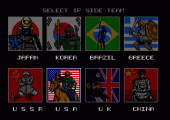
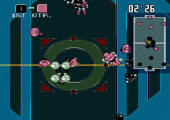
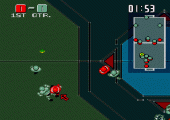
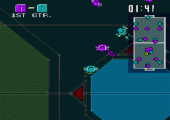

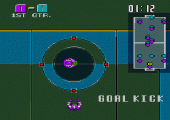
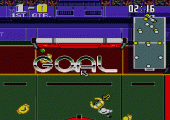
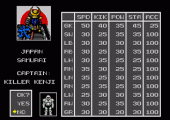

Recent Comments